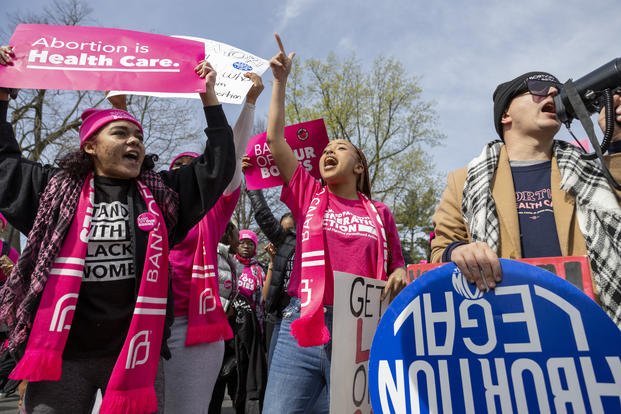A year-old Pentagon policy of paying for travel for service members who need reproductive health care that is not offered by the military -- including abortions -- was used 12 times from June through December, the Pentagon confirmed Tuesday.
Paying for transportation, lodging and meals for those 12 round trips from a service member's home station to the location of their health care cost the department $44,791, Pentagon spokesperson Sabrina Singh said during a public briefing to reporters. It was unclear how many of those trips involved abortion services, the area of the policy that has generated the most controversy.
Still, the numbers indicate that the travel policy, which was created in the wake of the Supreme Court ruling overturning Roe v. Wade and was the impetus for an Alabama Republican senator blocking hundreds of military promotions last year, has had minimal effect on a force of more than 2 million troops and a budget of more than $800 billion.
Read Next: Coast Guard Boats, Aircraft Search for Victims of Massive Bridge Collapse in Baltimore
"These policies ensure that service members and their families are afforded the time and flexibility to make private health care decisions, as well as supporting access to non-covered reproductive health care regardless of where they are stationed," Singh said.
She noted that the newly released data had several limitations, including that the department did not start tracking usage until months after the policy was implemented.
The Pentagon first announced in October 2022 that it would soon start providing travel allowances and offer administrative leave for service members who need reproductive health care that is not covered by the military and not offered by civilian doctors in the state they are based in.
The announcement came months after the Supreme Court issued the ruling in Dobbs v. Jackson Women's Health Organization in June 2022 that allowed states to start banning abortion. In February 2023, the Pentagon filled in more details about the policy and said it would take effect the following month.
While most attention on the policy has been related to abortion, it is also intended for service members who need to travel for fertility treatments such as in vitro fertilization, which has also recently come under threat by court rulings.
Days after the Pentagon's February 2023 announcement, Sen. Tommy Tuberville, R-Ala., announced he would block quick confirmations for all nominees to be general and flag officers until the Pentagon reversed the policy.
Tuberville's blockade lasted until December and eventually entangled more than 430 general and admiral nominees. As his Republican colleagues grew increasingly publicly frustrated that his actions were endangering national security, Tuberville dropped his hold in December with no concessions from the Pentagon and the reproductive health care policy still in place.
Among Tuberville's at-times shifting reasons for his protest were claims that the Pentagon policy could facilitate thousands of abortions a year. His claim was based on an estimate from a 2022 Rand Corp. report that between 2,573 and 4,136 active-duty service women have abortions annually. But the authors of the report had said it was likely fewer women would take advantage of the Pentagon policy.
Democrats, meanwhile, argued that Tuberville was risking the military chain of command over a policy that would have negligible effect compared to the overall size of the force and Pentagon budget.
Some of Tuberville's GOP supporters also pointed to the small number of troops expected to use the policy -- to argue the Pentagon was digging in its heels over a policy they contended there was little evidence was needed.
"My Republican colleagues and I asked you for evidence to support the Department of Defense's claim in a June 28, 2022, memorandum that the Supreme Court decision in Dobbs v. Jackson Women's Health Organization would have 'significant implications' for the 'readiness of the Force.' To date, we have yet to receive any substantive data to support these assertions," Senate Armed Services Committee ranking member Sen. Roger Wicker, R-Miss., wrote in a September letter to Defense Secretary Lloyd Austin.
Wicker's letter also said he had "received information" that "approximately 12" women had used the travel and leave policy.
The data released by the Pentagon on Tuesday tracks how many round trips were taken, not how many service members used the policy. Some treatments such as IVF could require multiple trips to the doctor, and service members are allowed to use the policy more than once, meaning potentially fewer than 12 service members used the policy between June and December.
The Pentagon has also not tracked what type of reproductive health care service members were traveling for, meaning it's impossible to know whether anyone received an abortion.
And while travel and leave were available as early as March 2023, the Pentagon did not start tracking the policy's usage until August, Military.com reported. While the Pentagon was able to collect data from as early as June, that still leaves usage in March, April and May unaccounted for.
Singh described the numbers released Tuesday as a "snapshot."
Also still unknown is whether any service members took leave without applying for travel reimbursement. The Pentagon did not release data Tuesday on the number of administrative absences taken under the policy.
Related: Six Months After New Abortion Leave Policy, Pentagon Doesn't Know How Many Troops Have Used It















